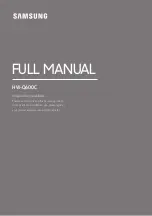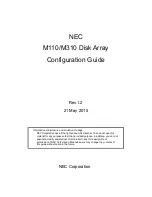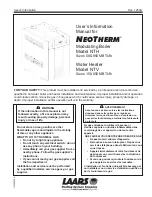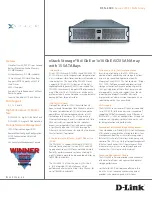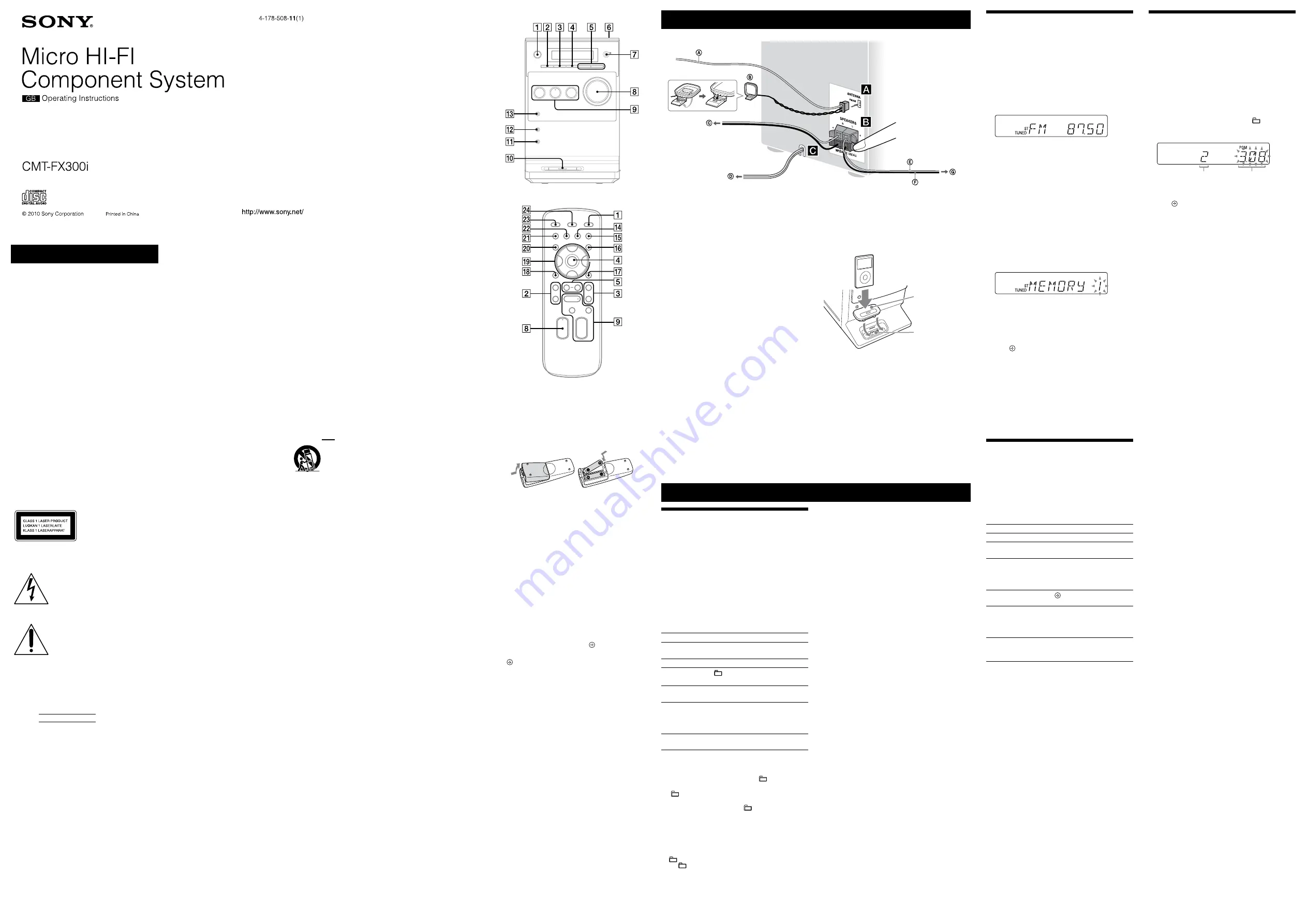
CMT-FX300i.GB.4-178-508-11(1)
WARNING
To reduce the risk of fire or electric shock,
do not expose this apparatus to rain or
moisture.
To reduce the risk of fire, do not cover the ventilation
opening of the apparatus with newspapers, tablecloths,
curtains, etc. Do not place the naked flame sources such
as lighted candles on the apparatus.
To reduce the risk of fire or electric shock, do not expose
this apparatus to dripping or splashing, and do not place
objects filled with liquids, such as vases, on the apparatus.
Do not install the appliance in a confined space, such as a
bookcase or built-in cabinet.
As the main plug is used to disconnect the unit from the
mains, connect the unit to an easily accessible AC outlet.
Should you notice an abnormality in the unit, disconnect
the main plug from the AC outlet immediately.
Do not expose batteries or apparatus with battery-
installed to excessive heat such as sunshine, fire or the
like.
The unit is not disconnected from the mains as long as it
is connected to the AC outlet, even if the unit itself has
been turned off.
CAUTION
The use of optical instruments with this product will
increase eye hazard.
Except for customers in the U.S.A. and
Canada
This appliance is classified
as a CLASS 1 LASER
product. This marking
is located on the rear
exterior.
Notice for the customers in the U.S.A. and
Canada
This symbol is intended to alert the
user to the presence of uninsulated
“dangerous voltage” within the
product’s enclosure that may be of
sufficient magnitude to constitute a risk
of electric shock to persons.
This symbol is intended to alert the
user to the presence of important
operating and maintenance (servicing)
instructions in the literature
accompanying the appliance.
Owner’s Record
The model and serial numbers are located on the rear of
the unit. Record these numbers in the space provided
below. Refer to them whenever you call upon your Sony
dealer regarding this product.
Model No.
Serial No.
Important Safety Instructions
1) Read these instructions.
2) Keep these instructions.
3) Heed all warnings.
4) Follow all instructions.
5) Do not use this apparatus near water.
6) Clean only with dry cloth.
7) Do not block any ventilation openings. Install in
accordance with the manufacturer’s instructions.
8) Do not install near any heat sources such as radiators,
heat registers, stoves, or other apparatus (including
amplifiers) that produce heat.
9) Do not defeat the safety purpose of the polarized or
grounding-type plug. A polarized plug has two blades
with one wider than the other. A grounding type
plug has two blades and a third grounding prong.
The wide blade or the third prong are provided for
your safety. If the provided plug does not fit into your
outlet, consult an electrician for replacement of the
obsolete outlet.
10) Protect the power cord from being walked on
or pinched particularly at plugs, convenience
receptacles, and the point where they exit from the
apparatus.
11) Only use attachments/accessories specified by the
manufacturer.
12) Use only with the cart, stand, tripod,
bracket, or table specified by the
manufacturer, or sold with the apparatus.
When a cart is used, use caution when
moving the cart/apparatus combination to
avoid injury from tip-over.
13) Unplug this apparatus during lightning storms or
when unused for long periods of time.
14) Refer all servicing to qualified service personnel.
Servicing is required when the apparatus has been
damaged in any way, such as power-supply cord or
plug is damaged, liquid has been spilled or objects
have fallen into the apparatus, the apparatus has
been exposed to rain or moisture, does not operate
normally, or has been dropped.
The following FCC statement applies only
to the version of this model manufactured
for sale in the U.S.A. Other versions may
not comply with FCC technical regulations.
NOTE:
This equipment has been tested and found to comply
with the limits for a Class B digital device, pursuant
to Part 15 of the FCC Rules. These limits are designed
to provide reasonable protection against harmful
interference in a residential installation. This equipment
generates, uses and can radiate radio frequency energy
and, if not installed and used in accordance with the
instructions, may cause harmful interference to radio
communications. However, there is no guarantee that
interference will not occur in a particular installation.
If this equipment does cause harmful interference to
radio or television reception, which can be determined by
turning the equipment off and on, the user is encouraged
to try to correct the interference by one or more of the
following measures:
Reorient or relocate the receiving antenna.
Increase the separation between the equipment and
receiver.
Connect the equipment into an outlet on a circuit
different from that to which the receiver is connected.
Consult the dealer or an experienced radio/TV
technician for help.
CAUTION
You are cautioned that any changes or modifications
not expressly approved in this manual could void your
authority to operate this equipment.
Note on DualDiscs
A DualDisc is a two sided disc product which mates
DVD recorded material on one side with digital
audio material on the other side. However, since the
audio material side does not conform to the Compact
Disc (CD) standard, playback on this product is not
guaranteed.
Music discs encoded with copyright
protection technologies
This product is designed to playback discs that conform
to the Compact Disc (CD) standard. Recently, various
music discs encoded with copyright protection
technologies are marketed by some record companies.
Please be aware that among those discs, there are some
that do not conform to the CD standard and may not be
playable by this product.
License and Trademark Notice
iPod is a trademark of Apple Inc., registered in the U.S.
and other countries.
MPEG Layer-3 audio coding technology and patents
licensed from Fraunhofer IIS and Thomson.
All other trademarks and registered trademarks are of
their respective holders. In this manual,
TM
and
®
marks
are not specified.
Operations
Creating your own program
(Program Play)
1
Select the CD function.
Press FU/
repeatedly.
2
Select the play mode.
Press PLAY MODE
repeatedly until “PGM”
appears while the player is stopped.
3
Select the desired track or file number.
Press
/
repeatedly until the desired
track or file number appears.
When programming MP3 files, press +/
repeatedly to select the desired folder, and then select
the desired file.
Selected track or file number
Total playing time of the selected
track or file
4
Program the selected track or file.
Press
to enter the selected track or file.
5
Repeat steps 3 through 4 to program additional
tracks or files, up to a total of 25 tracks or files.
6
To play your program of tracks or files, press
.
The program remains available until you open the CD
compartment. To play the same program again, press
.
To cancel Program Play
Press PLAY MODE
repeatedly until “PGM”
disappears while the player is stopped.
To delete the last track or file of the program
Press CLEAR
while the player is stopped.
To view program information, such as total
track number of the program
Press DISPLAY
repeatedly.
Getting Started
Unit
Remote
This manual mainly explains operations using the
remote, but the same operations can also be performed
using the buttons on the unit having the same or similar
names.
To use the remote
Slide and remove the battery compartment lid, and insert
the two R6 (size AA) batteries,
side first, matching the
polarities shown below.
Notes on using the remote
With normal use, the batteries should last for about six months.
Do not mix an old battery with a new one or mix different types of
batteries.
If you do not use the remote for a long period of time, remove the
batteries to avoid damage from battery leakage and corrosion.
When carrying this system
1
Remove a disc to protect the CD mechanism.
2
Press
(power)
on the unit to turn off the
system and confirm that “STANDBY” stops flashing.
3
Unplug the power cord.
To set the clock
1
Press
to turn on the system.
2
Press TIMER MENU
to select the clock set mode.
If “PLAY SET” flashes, press
/
repeatedly to
select “CLOCK,” and then press (enter)
.
3
Press
/
repeatedly to set the hour, then press
.
4
Use the same procedure to set the minutes.
Note
The clock settings are lost when you disconnect the power cord or if a
power failure occurs.
To display the clock when the system is off
Press DISPLAY
. The clock is displayed for about
8 seconds.
Antennas
Find a location and an orientation that provide good
reception, and then set up the antenna.
Keep the antennas away from the speaker cords and the
power cord to avoid picking up noise.
Speakers
Insert only the stripped portion of the cord.
Power
Connect the power cord to a wall outlet.
If the plug does not fit the wall outlet, detach the supplied
plug adaptor (only for models equipped with an adaptor).
Listening to the radio
1
Select “TUNER FM” or “TUNER AM.”
Press FU/
repeatedly.
2
Perform tuning.
For automatic scanning
Press TUNING MODE
repeatedly until “AUTO”
appears, and then press +
/
. Scanning
stops automatically when a station is tuned in, and
“TUNED” and “ST” (for stereo programs only) light
up in the display.
If “TUNED” does not light up and the scanning does
not stop, press
to stop scanning, then perform
manual tuning (below).
For manual tuning
Press TUNING MODE
repeatedly until
“MANUAL” appears, and then press +
/
repeatedly to tune in the desired station.
Tip
To reduce static noise on a weak FM stereo station, press FM MODE
repeatedly until “MONO” appears to turn off stereo reception.
Presetting radio stations
1
Tune in the desired station.
2
Press TUNER MEMORY
to select the tuner
memory mode.
3
Press +
/
repeatedly to select the desired
preset number.
If another station is already assigned to the selected
preset number, the station is replaced by the new
station.
4
Press
to store the station.
5
Repeat steps 1 through 4 to store other stations.
You can preset up to 20 FM and 10 AM stations. The
preset stations are retained for about half a day even
if you disconnect the power cord or if a power failure
occurs.
6
To call up a preset radio station, press TUNING
MODE
repeatedly until “PRESET” appears, and
then press +
/
repeatedly to select the
desired preset number.
Playing the iPod
1
Select the iPod function.
Press FU/
repeatedly.
2
Place the iPod.
3
Start playback.
Press
.
To control the iPod
To
Press
Pause playback
/
.
Scroll up/down
the iPod menus
/
.
Select a track
or chapter of
audiobook/
podcast
/
. To fast-forward or
fast-rewind, hold down the button.
Choose the
selected item
/
.
Find a point in a
track or chapter
of audiobook/
podcast
Hold down
/
during
playback, and release the button at
the desired point.
Return to the
previous menu or
select a menu
/TOOL MENU
/RETURN
(return)
.
To use the system as a battery charger
You can use the system as a battery charger for the iPod
when the system is on.
The charging begins when the iPod is placed on the iPod
connector. The charge status appears in the iPod display.
For details, see the user’s guide of your iPod.
To stop charging the iPod
Remove the iPod. Turning off the system also stops
charging the iPod.
Notes
When placing or removing the iPod, handle the iPod in the same
angle as that of the iPod connector on the unit and do not twist or
sway the iPod to prevent connector damage.
Do not carry the unit with an iPod set on the connector. Doing so
may cause a malfunction.
When placing or removing the iPod, brace the unit with one hand
and take care not to press the controls of the iPod by mistake.
Before disconnecting the iPod, pause playback.
Hold down
/
to fast-forward (fast-rewind) while
playing video if
/
does not function.
To change the volume level, use /
. The volume level
does not change even if adjusted on the iPod.
The iPod Dock
on the unit is designed for iPod only. You cannot
connect any other portable audio players.
To use an iPod, refer to the user’s guide of your iPod.
Sony cannot accept responsibility in the event that data recorded to
iPod is lost or damaged when using an iPod with this unit.
Playing a CD/MP3 disc
1
Select the CD function.
Press FU/
repeatedly.
2
Place a disc.
Press
PUSH OPEN/CLOSE
on the unit,
and place a disc with the label side up on the CD
compartment.
To close the CD compartment, press
PUSH OPEN/
CLOSE
on the unit.
3
Start playback.
Press
(play)
.
Other operations
To
Press
Pause playback
(pause)
. To resume play, press
the button again.
Stop playback
(stop)
.
Select a folder on
an MP3 disc
(select folder) +/
repeatedly.
Select a track or
file
(go back)
/
(go
forward)
.
Find a point in a
track or file
Hold down
(rewind)
/
(fast forward)
during playback,
and release the button at the desired
point.
Select Repeat Play REPEAT
repeatedly until “REP”
or “REP1” appears.
To change the play mode
Press PLAY MODE
repeatedly while the player is
stopped. You can select normal play (“ ” for all MP3
files in the folder on the disc), shuffle play (“SHUF”
or “ SHUF*” for folder shuffle), or program play
(“PGM”).
* When playing a CD-DA (audio) disc,
(SHUF) Play performs the
same operation as normal (SHUF) Play.
Note on Repeat Play
“REP1” indicates that a single track or file is repeated until you stop
playback.
Note on shuffle play mode
When you turn off the system, the selected shuffle play mode (“SHUF”
or “
SHUF”) is cleared and the play mode returns to normal play
mode (“
”).
Notes on playing MP3 discs
Do not save other types of tracks or files, or unnecessary folders on a
disc that has MP3 files.
Folders that have no MP3 files are skipped.
MP3 files are played back in the order that they are recorded onto
the disc.
The system can only play MP3 files that have a file extension of
“.mp3”.
Even when file name has the “.mp3” file extension, if the actual
file differs, playing this file may generate a loud noise which could
damage the speaker system and the system may malfunction.
The maximum number of:
folders is 255 (including the root folder).
MP3 files is 512.
folder levels (the tree structure of files) is 8.
Compatibility with all MP3 encoding/writing software, recording
device, and recording media cannot be guaranteed. Incompatible
MP3 discs may produce noise or interrupted audio or may not play
at all.
Notes on playing multisession discs
If the first session on the disc is a CD-DA session, the other sessions
on the disc cannot be recognized regardless of the session format;
only CD-DA tracks in the first session can be played back.
If the session format for the first session is CD-ROM and the
following sessions are recorded in the same format, the system will
continue to play back MP3 files accordingly in multiple sessions
until the system encounters another session recorded in a different
format.
FM lead antenna (Extend it horizontally.)
AM loop antenna
To right speaker
To wall outlet
To use the iPod
Insert an iPod Dock Adapter into the iPod Dock
before use.
iPod Dock Adapter
iPod Connector
To remove the iPod Dock Adapter, pull it up with your
fingernail or a flat object using the slot inside the adapter.
Note
The iPod Dock Adapter is not supplied with the system. Use the
adapter supplied with your iPod when using an iPod model. For
details on the iPod Dock Adapters, refer to the instructions supplied
with the iPod Dock Adapters.
To connect an optional headphones
Connect headphones to the PHONES jack
on the
unit.
Speaker cord (Red/
)
Speaker cord (Black/
)
To left speaker




